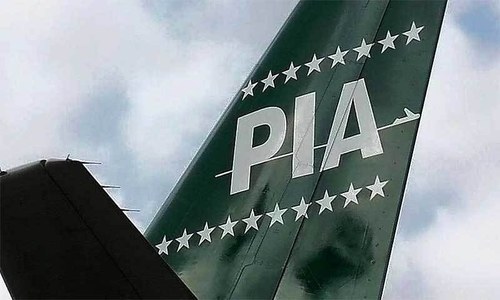Pakistan’s airlines have been sucked into a vortex of burgeoning losses. This is primarily because the protective clauses inherent in the aviation policy — which ensured the viability and sustained expansion of PIA and other domestic airlines — have been forfeited in favour of foreign air carriers.
The situation has now reached a point where foreign airlines operating in Pakistan, particularly those from the Gulf countries, have wrested complete control of the country’s long-haul passenger traffic to the US, Canada, the UK, EU and Saudi Arabia.
The concept of ‘fair and equal opportunity to airlines has been completely nullified — a situation no other nation would permit as it offers undue and unwarranted advantage to foreign carriers over national airlines.
While the aviation policy and bilateral agreement permit access to traffic between two countries, an unrestrained and unimpeded access allowed to foreign carriers in all spectrums of the country’s air traffic market is largely used by these carriers to uplift passengers to/from a third country via their Gulf country hub. Such carriage of passenger traffic is known in aviation parlance as ‘6th Freedom’.
An example would be the carriage of passengers from Pakistan to the UK via a third country such as Dubai (or Abu Dhabi or Qatar). It may be noted that there is has no legal sanction behind such practices and various countries have taken measures to curtail this in the form of controlling the flights of such airlines. Unfortunately, in this respect, the country’s policymakers have thrown caution to the winds and allowed foreign air carriers to flourish at the cost of its own airlines.
Allowing complete freedom to all foreign airlines to charge predatory prices has pushed domestic airlines out of the race by not allowing them to compete on a level playing field
Consequently, this laissez-faire policy has allowed unlimited seats and flights to air carriers operated by Gulf nations (as well as certain other countries) by opening all ten to twelve international gateways in Pakistan against allowing access to only one.
Furthermore, allowing complete freedom to all foreign airlines to charge predatory prices has pushed our airlines out of the race by not allowing them to compete on a level playing field.
Given this scenario, whether the expansion of PIA’s operations to long-haul international destinations will enable it to retrieve its lost market share from Gulf carriers, or take it up a blind alley, needs to be critically evaluated.
Utterly ignorant of the intricacies of air services agreements and the dynamics of the emerging international aviation scenario, as well as the grave repercussions of their policies on national airlines, the powers that be have been wreaking havoc on the domestic aviation sector ever since 1998.
Moreover, the woes of the national airline were exacerbated by frequent changes of CEO’s and chairmen (over 18 in a period of 18 years) and a staggering accumulated loss of Rs260bn, virtually liquidating the airline.
All professional suggestions to stem the accelerating decline were spurned on the pretext that losses have decreased because of the corrective measures taken by the management. This, in fact, was false because the reduction of losses was actually attributable to the massive decline in fuel prices. Fuel and oil constituted 42pc of total cost in 2014 declining to 26pc in 2015 and then to 20pc in 2016, as per recent estimates.
The vision for the long-term revival of PIA remains murky as neither are the avenues of expansion definitive due to the 6th Freedom carriage syndrome, nor are the aircraft acquisition plans for expansion based on any realistic assumption of the state of aviation in the region and the world over.
The most critical areas for the solution of the carriage of 6th Freedom passenger traffic is the defined need to counteract the massive spillage of long-haul traffic, without which PIA has no chance for survival and will consequently continue groping in the dark. Hiring top-level aviation specialists from around the globe and paying them millions of dollars in consultancy fees will not provide a remedy to the inherent problem, as they will not be able to deliver an enduring solution.
The talk of splitting the national carrier into PIA-I and PIA-II, primarily to present a clean balance sheet to any prospective investor, will further add to the confusion.
Any prospective investor from the airline industry may take up the offer, but once these deep-rooted problems rear their ugly head, the investor will inevitably look for other avenues to salvage their investment.
In consequence, the investor may opt out until these 6th Freedom problems are resolved, or may even change business strategy by using Pakistan’s market as a back yard for another airline’s benefit.
Finally, because policymakers cannot envision a solution to the problem they tend to treat this 6th Freedom matter as a fait accompli.The problem has to be resolved in the spirit of reconciliation by taking all stakeholders on board and without a confrontational approach
Thus, they are reluctant to analyse, debate or pursue any rational proposals which may have been submitted to the government lately and which may provide an out-of-the-box, workable, innovative and guaranteed solution that can turnaround the fortunes of the PIA within a short span of time.
This continued fixation with disastrous anti-national policies is an act of omission and commission while the PIA continues to bleed, requiring the repeated injection of huge funding to survive.
And Pakistan suffers because of its own short sighted and ill-conceived policies.
The writer is a former deputy managing director and chief operating officer, PIA.
Published in Dawn, Business & Finance weekly, December 19th, 2016














































